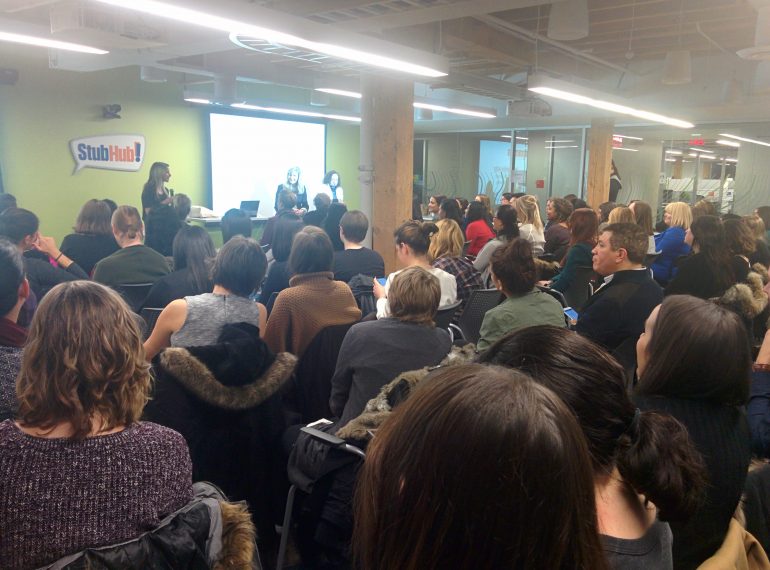When Girls in Tech Toronto (GITT) was founded in 2011 by Neha Khera and Lucia Mariani, ten people showed up to the event, held at a bar in Liberty Village. “There are a lot of women doing amazing things and we wanted to provide a platform for those women to share their stories,” said Khera, who is an investment manager with the MaRS Investment Accelerator Fund.
“If a woman wants to be in tech she needs to be comfortable with the fact that she might be the only person in her class, or only woman in her company.”
– Renata Vaccaro
This week, GITT celebrated its fifth birthday with an event sold out two weeks in advance, and 100 people still on a waiting list. Since founding the not-for-profit — which is part of the umbrella Girls in Tech organization boasting 57 chapters and 12,000 member worldwide — Mariani, a partner in digital and business development at Feast Interactive, said that GITT has maintained its vision to remain a totally informal, fireside-style event where women could gather and unapologetically share the good and bad of their experiences in a male-dominated field.
“Traditionally networking can be stuffy, happen on a golf course or big ballrooms where it’s really awkward and tight, and just too formal,” said Mariani, adding that compared to five years ago, the Toronto startup community has evolved immensely and has become on par with startup hubs like San Francisco and New York. “At that time, looking for a network of women or events with people that were inspiring didn’t exist, especially in the tech community. They were very male-oriented events.”
The speakers at the event represented the creative, entrepreneurial, and the leadership skills required in an industry where people build from the ground up. Renata Vaccaro, who has worked in the tech industry for 18 years and is a technical director at Klick, talked about the importance of encouraging women to pursue STEM careers, and how she has been told that she apparently doesn’t look like a computer programmer.
We don't even know what the world would look like if we gave [women] the power of tech – Renata @klickhealth #STEM @GITdot #PowerHourSocial
— Yael Sarah Magid (@yaelsarahm) February 10, 2016
“I didn’t care previously because I thought, if a woman wanted to be in tech, she could be. Because after all, here I am,” said Vaccaro. “What I didn’t realize is that if a woman wants to be in tech she needs to be comfortable with the fact that she might be the only person in her class, or only woman in her company, and needs to be comfortable with the fact that she doesn’t fit the stereotype.”
These stereotypes can affect whether or not a woman feels that she “belongs” in certain spaces; according to StatsCan, young men were more likely to opt for a STEM program with marks under 80 percent; yet, women who achieved at least 90 percent in math were less likely to pursue STEM than men who received marks in the 80 to 89 percent range.
After Vaccaro, the event brought on Abigail Keeso, founder of clean eating, meal planning platform That Clean Life, who took the plunge into tech during her career as a registered nurse after being told by her partner that her blog, with a dedicated fan base, was a validation of her idea. “’I’m not a dietitian, I have no experience in business and I certainly don’t know anything about software. We cannot build a platform,'” she said. “I wasted many months going over all the reasons why we shouldn’t.”
Abigail Kesso co-founder @ThatCleanLife shares how clean eating transformed her life from darkness to brightness. pic.twitter.com/0NWKZID0Ww
— GirlsinTech Toronto (@GITdot) February 10, 2016
Fittingly, the event ended off with some notes from futurist and science fiction writer Madeline Ashby, who has worked with organizations like Engineers Without Borders Canada and the Institute for The Future. She talked about her commissioned work where organizations ask her to write about how the future of certain issues — for example, she wrote a dystopian story about a ‘border town’ at the border of Arizona where those who wanted to cross the border lived in a town where they were evaluated by neighbours on whether they were ‘good’ enough to enter America.
She also spoke about the state of science in the 21st century. “I think we’re not doing enough to combat huge systemic problems, and we are not taking science seriously,” she said. “Even though we live in the 21st century, we are also ruled by governments that don’t value intellect. It’s not anti-science, they love science when it’s in their phone. But they hate science when it might undercut investments.”
As the speakers spanned varied industries that seemed to appeal to any vertical, Khera said that GITT emphasizes the celebration of all women who want a platform; the organizers don’t screen clients and invite women who have a valuable story to tell with the aim of bringing fresh faces to the forefront of tech thought leadership.
“Anybody who’s in this industry doing anything remotely interesting should speak,” Khera said. “A few times in the past, we’ve reached out to big conference organizers and asked why there are so few women on their panels. They say they can’t find them. That’s bogus. Come reach out to us next time and we’ll give you a ton of names.”


